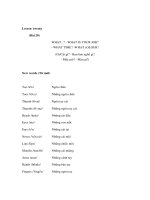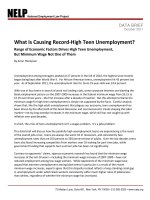session1 what is organizational beahvior
Bạn đang xem bản rút gọn của tài liệu. Xem và tải ngay bản đầy đủ của tài liệu tại đây (1.1 MB, 73 trang )
What is Organizational
Behavior?
OBJECTIVES
After studying this chapter, you should
be able to:
1. Describe what managers do.
LEARNING
2. Define organizational behavior (OB).
of OB. 3. Explain the value of the systematic study
4. Identify the contributions made by major
behavioral science disciplines to OB.
5. List the major challenges and
opportunities for managers to use OB
concepts.
Organisational Behavior
What Managers Do
Managers (or administrators)
Individuals who achieve goals through other people.
Managerial
ManagerialActivities
Activities
••Make decisions
••Allocate resources
••Direct activities of others
totoattain
attaingoals
goals
Organisational Behavior
Where Managers Work
Organization
A consciously coordinated social unit,
composed of two or more people, that
functions on a relatively continuous basis
to achieve a common goal or set of
goals.
Organisational Behavior
Management Functions
Planning
Planning
Organizing
Organizing
Management
Management
Functions
Functions
Controlling
Controlling
Leading
Leading
Management Functions (cont’d)
Planning
A process that includes defining goals,
establishing strategy, and developing
plans to coordinate activities.
Organisational Behavior
Management Functions (cont’d)
Organizing
Determining what tasks are to be done,
who is to do them, how the tasks are to
be grouped, who reports to whom, and
where decisions are to be made.
Organisational Behavior
Management Functions (cont’d)
Leading
A function that includes motivating
employees, directing others, selecting
the most effective communication
channels, and resolving conflicts.
Organisational Behavior
Management Functions (cont’d)
Controlling
Monitoring activities to ensure they are being
accomplished as planned and correcting any
significant deviations.
Organisational Behavior
Mintzberg’s Managerial Roles
E X H I B I T 1–1
Source: Adapted from The Nature of Managerial Work by H. Mintzberg. Copyright © 1973
by H. Mintzberg. Reprinted by permission of Pearson Education.
E X H I B I T 1–1
Organisational Behavior
Mintzberg’s Managerial Roles (cont’d)
E X H I B I T 1–1 (cont’d)
Source: Adapted from The Nature of Managerial Work by H. Mintzberg. Copyright © 1973
by H. Mintzberg. Reprinted by permission of Pearson Education.
E X H I B I T 1–1 (cont’d)
Organisational Behavior
Mintzberg’s Managerial Roles (cont’d)
E X H I B I T 1–1 (cont’d)
Source: Adapted from The Nature of Managerial Work by H. Mintzberg. Copyright © 1973
by H. Mintzberg. Reprinted by permission of Pearson Education.
E X H I B I T 1–1 (cont’d)
Organisational Behavior
Management Skills
Technical skills
The ability to apply specialized
knowledge or expertise.
Human skills
The ability to work with, understand,
and motivate other people, both
individually and in groups.
Conceptual Skills
The mental ability to analyze and
diagnose complex situations.
Organisational Behavior
Skills Needed at Different Levels
of Management
Top
management
HumanConceptual
Technical
Middle
HumanConceptual
Technical
management
ptual
Technical
First-line
management
Organisational Behavior
Effective Versus Successful Managerial
Activities (Luthans)
1. Traditional management
••Decision making, planning, and controlling
2. Communication
••Exchanging routine information and processing
paperwork
paperwork
3. Human resource management
••Motivating, disciplining, managingconflict, staffing,
and training
and training
4. Networking
••Socializing, politicking, and interacting with others
Organisational Behavior
Allocation of Activities by Time
Organisational Behavior
Willson’s managerial skills on 11
observable categories
Skills Exhibited by an Effective Manager
1. Clarifies goals and objectives for everyone involved
2. Encourage participation, upward communication, and suggestion
3. Plans and organizes for an orderly work flow
4. Has technical and administrative expertise to answer organization-related questions
5. Facilitates work though team building, training, coaching, and support
6. Provides feedback honestly and constructively
7. Keeps things moving by relying on schedules, deadlines, and helpful reminders
8. Controls details without being overbearing
9. Applies reasonable pressure for goals accomplishment
10. Empowers and delegates key duties to others while maintaining goal clarity & commitment
11. Recognizes good performance with rewards and positive reinforcement
Organisational Behavior
Evolution of the 21st Century Manager
- Robert Kreitner & Angelo Kinicki
PastManagers
FutureManagers
Primaryrole
Ordergiver,privilegedelite,controller
Facilitator,teammember,teacher,sponsor
Learning&Knowledge
Periodiclearning,narrowspecialist
Long-lifelearning,generalistwithmultiple
specialties
Compensationcriteria
Time,effort,rank
Skillsandresults
Culturalorientation
Monocultural,monolingual
Multicultural,multilingual
Primarysourceofinfluence
Formalauthority
Knowledge(technicalandinterpersonal
Viewofpeople
Potentialproblem
Primaryresource
Primarycom.cationpattern
Vertical
Multidirectional
Decision-makingstyle
Limitedinputforindividualdecisions
Broad-basedinputforjointdecisions
Ethicalconsiderations
Afterthought
Forethought
Natureofinterpersonal
Competitive(win–lose)
Cooperative(win–win)
Hoardandrestrictaccess
Shareandbroadenaccess
relationships
Handlingofpowerandkey
information
Approachtochange
Resist
Facilitate
Organisational Behavior
Enter Organizational Behavior
Organizational behavior (OB)
A field of study that investigates the
impact that individuals, groups, and
structure have on behavior within
organizations, for the purpose of
applying such knowledge toward
improving an organization’s
effectiveness.
Organisational Behavior
Complementing Intuition with
Systematic Study
Intuition
“Gut” feelings about “why I do what I do” and “what
makes others tick”.
Systematic study
Looking at relationships, attempting to attribute
Influences on OB.
• Individuals
• Groups
• The organisation itself
• The environment
Organisational Behavior
Individuals
• Are a central feature of OB
• Are a necessary part of any behavioural set
• Bring to the organisation their personality, skills and
attributes, values, needs and expectations
• Can create conflict if their needs and the demands of
the organisation are incompatible
Organisational Behavior
Management and the individual
Management’s task is to integrate the individual &
the organisation, providing a working environment
that permits the satisfaction of individual needs &
attainment of organisation goals
Organisational Behavior
Groups
• Exist in all organisations
• Are essential to organisational working and
performance
• Comprise a range of different individuals
• Can develop their own hierarchies and leaders
Organisational Behavior
Groups
• Can have a major influence on behaviour and
performance of individual members
• Have their own structures and functions, role
relationships and influences and pressure
An understanding of group structure and behaviour
complements a knowledge of individual behaviour
Organisational Behavior









